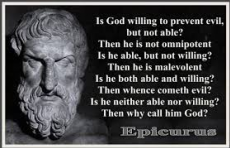

The Irenaean theodicy states that it is necessary to have moral evil as it allows for humans to make wrong or right decisions. God has given the choice of good and evil, which then allows a human to develop into children of God. If a ‘Hedonistic Paradise’ was achieved, a world with no suffering, humans would lose an essential purpose, that purpose being to develop and become a perfect being.
Therefore suffering and evil are useful as a means of knowledge, building character, and for a predictable environment. The knowledge of pain prompts humans to seek to help others in pain, thus creating good. As Irenaeus said ‘a world without problems, difficulties, perils and hardships would be morally static.’ For moral and spiritual growth comes through response to challenges and in a paradise there would be no challenges. Evil offers the opportunity to grow morally and as Swinburne said ‘we would never learn the art of goodness in a world designed as a complete paradise.’ Swinburne says that the moral virtues which we admire are only possible in an important world.
Furthermore Irenaeus follows his points with the fact that certain second order goods would not be present without suffering. For example if someone was always successful, determination would not exist. In order for someone to be determined, there must be the opportunity for failure, otherwise one would not try.
According to Hick, it the world is not a ‘Hedonistic Paradise’ then it is a ‘vale of soul making’ where people become ‘heirs to eternal life.’ This justifies God’s creation as there Irenaes believed that there was a second stage of creation which can be completed through free choice in to ‘children to God.’ The term ‘soul making’ is used to describe the process of moral growth which God intended to happen when giving free will. If God interfered, human freedom would be undermined and it would not allow for moral growth to happen. Hick says that with God creating us at an ‘epistemic distance’ God deliberately creates uncertainty for God’s existence. With humans not knowing definitely that God is there watching, we do not act out of fear but instead act morally for our virtue.
As Irenaeus recognised that not everyone achieves moral goodness in this lifetime and that some proceed to moral degradation; this must mean that there is a heaven which can allow a soul to make up for it and become moral. This belief is called ‘universal salvation,’ the belief that everyone goes to heaven.
There are criticisms for the Irenaean theodicy due to Irenaeus’ reasoning for the allowance of suffering by God being unjust. The first criticism raises the question, do the ends justify the means? By God deliberately creating an imperfect world with the intention for humans to morally grow and develop it suggests that it is acceptable to do something bad to achieve something good. For example, it would be ok to beat someone up one day, because that person will then take that person to their favourite restaurant the next day. It seems highly unfair to say that suffering is ok because something good will come after.
Image- http://www.logicandlight.org/the-problem-of-evil/

0 Comment:
Be the first one to comment on this article.